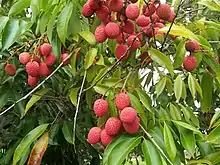荔枝
Chinese
| phonetic | branch; (a measure word) | ||
|---|---|---|---|
| trad. (荔枝) | 荔 | 枝 | |
| simp. #(荔枝) | 荔 | 枝 | |
| variant forms | |||

Etymology
Unknown. First attested as 離支 in the “Rhapsody on the Shanglin Park” (上林賦) by Sima Xiangru of the West Han dynasty. During the time of Emperor Wu of Han, lychee was one of the exotic plants cultivated in the grand imperial Shanglin Park, introduced from China's south.
Traditionally, 荔 has been interpreted as equivalent to 劙 (“to sever; to partition”), based on an excerpt from Funan-ji (扶南記), a now-lost text cited in other works, such as the Taiping Guangji (太平廣記):
- 荔枝為名者,以其結實時,枝條弱而蒂牢,不可摘取,以刀斧劙取其枝,故以為名。 [Classical Chinese, trad.][▼ expand/hide]
- From: Taiping Guangji (Extensive Records of the Taiping Era), 978 CE
- Lìzhī wéi míng zhě, yǐ qí jiéshí shí, zhītiáo ruò ér dì láo, bùkě zhāiqǔ, yǐ dāofǔ lí qǔ qí zhī, gù yǐ wéi míng. [Pinyin]
- That which bears the name lizhi, when it bears fruits, the small branches are weak but the stem is firm, so it cannot be picked by hand and must be severed with a knife or axe, hence its name.
荔枝为名者,以其结实时,枝条弱而蒂牢,不可摘取,以刀斧劙取其枝,故以为名。 [Classical Chinese, simp.]
The Compendium of Materia Medica, citing the “Preface to Lychee Painting” (荔枝圖序) by Bai Juyi, interprets 離支 orthographically:
- 白居易云:若離本枝,一日色變,三日味變。則離支之名,又或取此義也。 [Classical Chinese, trad.][▼ expand/hide]
- From: The Compendium of Materia Medica [Bencao Gangmu], by Li Shizhen, 1578 CE
- Bái Jūyì yún: ruò lí běn zhī, yī rì sè biàn, sān rì wèi biàn. Zé lìzhī zhī míng, yòu huò qǔ cǐ yì yě. [Pinyin]
- Bai Juyi said, “If it [lychee] was removed from the branch, its colour will change in a day, its taste in three days.” So the name lizhi [lit. “removed from branch”] may be chosen for this meaning.
白居易云:若离本枝,一日色变,三日味变。则离支之名,又或取此义也。 [Classical Chinese, simp.]
Recent studies have discounted the above as folk etymologies, proposing instead that it is a disyllabic borrowing from a Tai-Kadai language during the Late Old Chinese period; compare modern Zhuang laehcei, Tai Nüa ᥛᥣᥐᥱᥐᥣᥭᥱ (maak3kaay3), Hlai coeis (Wei, 2000; Ban and Su, 2017). The precise shape of the source word is now obscure, and there are two possibilities that can explain the disyllabicity of the borrowing (Ban and Su, 2017):
- That the first syllable transcribed a Tai-Kadai class noun (perhaps “fruit”), and the second syllable, 枝 (OC *kje), corresponded to the Tai-Kadai name for “lychee”; or
- That the Tai-Kadai source word for “lychee” was disyllabic and already not easily analysable.
Pronunciation
Synonyms
Descendants
Others:
- → Assamese: লিচু (lisu), লেচু (lesu)
- → Burmese: လိုက်ချီး (luikhkyi:)
- → Czech: liči
- → Danish: litchi
- → English: lychee, litchi
- → Finnish: litsi
- → French: letchi, litchi
- → German: Litschi
- → Hungarian: licsi
- → Hindi: लीची (līcī)
- → Indonesian: leci
- → Italian: litchi
- → Japanese: ライチ (raichi)
- → Korean: 리치 (richi)
- → Lao: ໝາກລິ້ນຈີ່ (māk lin chī)
- → Malay: laici
- → Spanish: lichi
- → Polish: liczi
- → Portuguese: lichia
- → Russian: ли́чи (líči)
- → Thai: ลิ้นจี่ (lín-jìi)